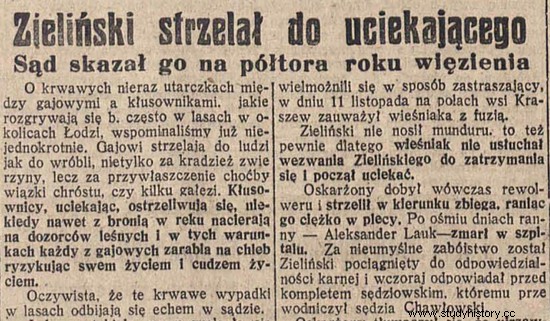The neighbor to the neighbor was a wolf before the war. This is beyond doubt. However, the representatives of one specific profession had the worst. One can even risk a statement that it was the most dangerous profession in pre-war Poland. What profession are we talking about? Well, oh ... gamekeepers.
Before the war, the gamekeeper was primarily a law enforcement officer. However, he did not guard people, but forests - against poaching, theft of wood, and illegal gathering. According to court data, these were the most common crimes in pre-war Poland. For example, in the "Yearbook of the Statistics of the Republic of Poland" for 1928, there were 62,000 cases of thefts from the field and forest , 1,420 horse thefts and 1,150 cattle thefts and 8348 poaching .
The gamekeepers had their hands full, and the peasants did everything not to get caught. There was a constant war between both of them. And it's an unequal war, because its victims fell almost exclusively to the groves.
With an ax in my head
On February 14, 1927, a forester from the Grodno poviat was killed after being hit on the head with an ax. He was unlucky enough to catch the wood thieves red-handed:
Aleksy Mikulicz went to the forest on the critical day to find the pines that had been felled by thieves. While looking for this tree, he found Kozłowski and Bućko, who were cutting down the fourth pine. Mikulicz was hit by an ax cut on the head. An ax with traces of blood was found during the search. Kozłowski and Bućka were arrested. They did not plead guilty.
Also in 1927 the trial of a certain Malinowski ended, who was sentenced by the Warsaw appellate court to ten years of hard imprisonment for the murder of the gamekeeper Grabowski. The motive of the crime? Revenge. Malinowski had been threatening Grabowski for a long time that he would get back at him for accusing him of poaching. One day they met away from the forester's lodge and then the poacher killed him with a shot from a gamekeeper's shotgun.

The profession of a gamekeeper in the Second Polish Republic was burdened with a high risk. And it's not about Lyme disease, but about poachers who were even ready to kill when someone got in their way. This is evidenced, for example, by this article in "Dziennik Łódzki" of November 26, 1931
The gamekeeper is only wrong once
There were dozens of similar cases reported casually by the newspapers. In 1926 "Dziennik Białostocki" reported, inter alia, about a gamekeeper from Białaszewo, who was shot in his drumstick with a rifle during the tour; about a gamekeeper from the state forests working in the Białowieża Primeval Forest, who was shot in the left shoulder when was looking your cows in the forest ; or even the guardian of the forests near Stryj in Eastern Lesser Poland, who died with a poaching bullet hit in the stomach.
On the basis of these and similar press releases, one can probably conclude that the average Polish gamekeeper had a worse life than a sapper, a member of the Border Protection Corps and a lion trainer ... put together. And yet these are just series examples! Some of the stories had their own unique color.
In July 1923 "Dziennik Białostocki" reported two incidents with such unlikely twists and turns that it is hard to believe in the complete reliability of journalists. The bloody specter of Szela led the peasant mob to crime! The letters of the header shouted on July 26. Peasants from the village of Ossów near Radzymin decided out of nowhere to kill the local heiress, Mrs. Reniewiecka, and the gamekeeper Wiśniewski, who was mercilessly combating forest thefts.
The howling fat rushed outside and plundered it. P. Reniewiecka escaped on time when she was warned. On the other hand, gamekeeper Wiśniewski was captured and dragged into the forest. The unhappy man begged to be spared his life, as he would leave his small children orphans. These pleas were greeted with laughter and cynical insults. The poor victim was tied to a tree, abused for a long time, beaten, kicked until it was finally decided to murder.
Mayor from hell
Like in a good thriller, the police ran into the clearing at the last possible moment - when the peasant axes already rose above Wiśniewski's head. Law enforcement officers rushed to the incited crowd, and the crowd unanimously decided to resist the arrest. When the snowstorm settled down and the most bloody peasants were arrested, it turned out that the ringleader of the incident was ... a local village leader!

They were shooting poachers not only from the gamekeepers. Police officers also reached for weapons. Sometimes, however, they abused their powers and ended up in jail. Excerpt from an article published in "Ilustrowana Republika", March 8, 1935
A day later, the same newspaper reported on even more brutal peasant lynch. Once again, the victim was the gamekeeper - the number one public enemy for every Polish village.
In the settlement of Bagno near Wołomin, the canal was the bone of contention, namely the drainage ditch on the border of the property of the local heiress, Mrs. Hryniewicka. A few years ago, the heiress left, and the peasants illegally filled the entire canal, which caused the water to flood her soil. After her return, furious Hryniewiecka received a warrant from the starost, pursuant to which the villagers were to repair the damage. Finally, the mayor called them for one day, at eight in the morning. Everyone came with shovels, but the village administrator did not force them to work. On the contrary, he suddenly made a passionate speech:
Dziedzicka, damn damn lost from the field will spend us, bury some "Reich" ditches. Don't give up, boys!
The crowd needed no further encouragement, and the speaker felt like a fish in the water as the leader of the peasant uprising. Less than a quarter of an hour has passed and he has already pronounced:murder the heiress!

Ruthless, decisive and deadly. The most famous criminals of pre-war Poland in the book by Kamil Janicki "Fallen ladies of the Second Republic". Buy with a discount on empik.com.
Broken fat she headed for the manor, shaking shovels and axes menacingly. Admittedly, the forewarned heiress fled to where pepper grows, but the peasants were relentless. They wanted to kill someone this fine morning at all costs. The gamekeeper, Mr. Wiśniewski, just happened to come across. As he was the "right hand" of Hryniewiecka and he administered the estate to some extent, they immediately dragged him out of the court:
- Drown him in the channel! command was given. In vain he resisted unhappy, pleaded in vain for mercy. Which of the men, a former soldier of the Russian army, has now deprived the mayor of power over the fat.
- Tie him up! he ordered (...). The tied up unfortunate man was dragged into the forest, to the canal. (…) Sentenced to death, he threw himself to his knees and, in a sobbing voice, begged for mercy. He also explained that it was black ingratitude to pay him with death for so much kindness as he had shown the peasants.
A forester with a heart of gold
- Who let you steal the tree from the forest after the heiress left? So you pay me so thankless? He asked, splashing into tears.
The peasants apparently had completely flawed memories, because neither of them was touched by their conscience at that moment. Again, at the very last moment the police burst into the clearing. The proud inhabitants of Bagno did not intend to sell the skins cheaply and immediately sent ... for meals to a neighboring village. It was only with the use of weapons that it was possible to tame the would-be murderers and put them in custody. Anyway, none of them stayed behind bars for longer. They all left right on bail. I wonder if they went back to talk to the gamekeeper?
Sources:
The article is based on source materials and literature collected during the work on the book "Upadłe damy II Rzeczpospolitej". You can buy the book with a discount at empik.com .
